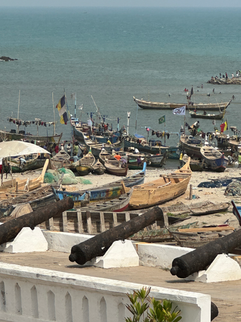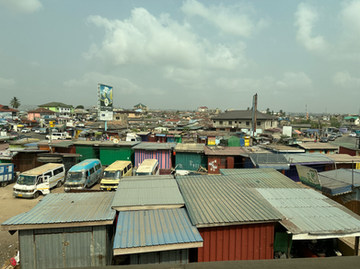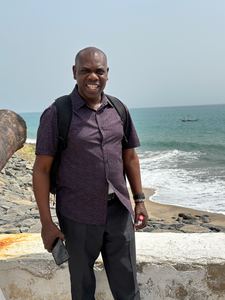Whenever I return to Ghana with one of our teams from Seven Hills Global Outreach, I make a point of traveling 2.5 hours to the coast of Ghana to visit what’s called “Cape Coast Castle.” As in past years, it is a sobering reminder to us all what slavery and the African slave trade were on a very intimate and human level. Cape Coast Castle was originally a Swedish trading post in the 1500s - 1600, later built as an actual stone castle by the Portuguese and eventually taken by the British, who controlled Cape Coast and the African slave trade for nearly 200 years. Cape Coast Castle, one of over 40 such slave trade ports along the Gold Coast (now called Ghana), sent over 3 million men, women, and children to the Caribbean, Americas, and European slave markets, where human beings were bought and sold like cattle. Our stay in Ghana has been brief, resulting in an agreement yesterday to help build a new vocational training center in the village of Djorkpo. So, today's visit to Cape Coast broadened our understanding of the historical backdrop in which SHGO works in Africa today.
Visiting this castle along the Atlantic is equally sobering for my Clark students and Seven Hills staff alike in that it lays bare the reality of how a privileged group of people could historically justify the barbaric treatment of other humans. The photos accompanying this post reflect the horrors committed here and the hope that such acts will never occur again. The only photos attached that were not taken today are those of the cast faces of the enslaved people held at Cape Coast, which I photographed several years ago on a previous visit here. Men and women were separated from each other and their children and held in dark catacomb dungeons with no light, no fresh air, no toileting facilities, and nothing to sleep on. Feces, urine, and every manner of bodily fluid imaginable covered the floors of each dungeon, holding 100-150 people each. If they survived, they were brought above ground, branded with the mark of their owner, (often a slave trade company), and then sold in the castle courtyard before exiting the Door of No Return. After leaving the castle through this door, enslaved people were ferried by boat out to the harbor where merchant ships collected them, threw them in the hold of the ship, and set sail to some distance market. Up to 70 million people were enslaved over 4 centuries and sent from Ghana to distant ports, including Charleston, South Carolina, where I completed my doctoral studies and walked by the “slave market“ routinely.
This will be the only day of our 2025 SHGO work in West Africa that we are not directly engaging with the women and children we are here to assist. Still, it’s important to understand where so many of our Seven Hills staff, be they newly immigrated from an African nation or African/Americans long part of our American culture and mosaic, find their historical roots. We honor our Seven Hills staff from all over the world, and today, it gave us all - staff and students alike - a broader context for our lives in America. To a large extent one might argue that the America we see today has roots in Ghana through the millions of people who walked through the “Door of no Return” here at Cape Coast Castle.
Earlier tonight, we met to discuss the most significant moments each of us has experienced or witnessed during our brief time in Ghana, to share our “pearls,” if you will. This daily exercise has been an emotionally charged experience for everyone on our SHGO teams over the past 15 years, and starting tonight, the experiences shared by each were no less powerful for our team. I want to express my appreciation to Ashish, Sarita, Barbara, and Pastor Kariuki for being so open in all of what was accomplished in the villages of Nyitawuta and Djorkpo yesterday and in our immersion into the history of slavery centered here in Ghana today.
Tomorrow, Monday, January 7, we start our trip north to Sierra Leone, where SHGO has a 15-year history of work creating schools, medical clinics, clean water wells, village latrines, and other initiatives to uplift the “poorest of the poor.” We arrive in Freetown, Sierra Leone, late afternoon tomorrow and drive 3 hours to our SHGO / Zion Ministries campus the following morning to continue our work supporting 26 rural villages. I wish you all the best and hope you’ll continue to follow our efforts here in West Africa.
Dr. David A. Jordan, DHA, MPA
Dean, School of Business
& Social Entrepreneur-In-Residence
Clark University
President Emeritus
Seven Hills Foundation










































Comments